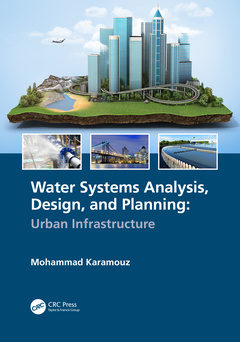Water Systems Analysis, Design, and Planning Urban Infrastructure

This book presents three distinct pillars for analysis, design, and planning: urban water cycle and variability as the state of water being; landscape architecture as the medium for built-by-design; and total systems as the planning approach. The increasing demand for water and urban and industrial expansions have caused myriad environmental, social, economic, and political predicaments. More frequent and severe floods and droughts have changed the resiliency and ability of water infrastructure systems to operate and provide services to the public. These concerns and issues have also changed the way we plan and manage our water resources.
Focusing on urban challenges and contexts, the book provides foundational information regarding water science and engineering while also examining topics relating to urban stormwater, water supply, and wastewater infrastructures. It also addresses critical emerging issues such as simulation and economic modeling, flood resiliency, environmental visualization, satellite data applications, and digital data model (DEM) advancements.
Features:
- Explores various theoretical, practical, and real-world applications of system analysis, design, and planning of urban water infrastructures
- Discusses hydrology, hydraulics, and basic laws of water flow movement through natural and constructed environments
- Describes a wide range of novel topics ranging from water assets, water economics, systems analysis, risk, reliability, and disaster management
- Examines the details of hydrologic and hydrodynamic modeling and simulation of conceptual and data-driven models
- Delineates flood resiliency, environmental visualization, pattern recognition, and machine learning attributes
- Explores a compilation of tools and emerging techniques that elevate the reader to a higher plateau in water and environmental systems management
Water Systems Analysis, Design, and Planning: Urban Infrastructure serves as a useful resource for advanced undergraduate and graduate students taking courses in the areas of water resources and systems analysis, as well as practicing engineers and landscape professionals.
Chapter 1 Introduction
Chapter 2 Urban Water Cycle and Interactions
Chapter 3 Urban Water Hydrology
Chapter 4 Urban Water Hydraulics
Chapter 5 Urban Stormwater Drainage Systems
Chapter 6 Urban Water Supply Infrastructures
Chapter 7 Wastewater Infrastructure
Chapter 8 Urban Water Economics—Asset Management
Chapter 9 Urban Water Systems Analysis and Conflict Resolution
Chapter 10 Risk and Reliability
Chapter 11 Urban Water Disaster Management
Chapter 12 Urban Hydrologic and Hydrodynamic Simulation
Chapter 13 Flood Resiliency of Cities
Chapter 14 Environmental Visualization
Mohammad Karamouz is a professor at the University of Tehran. He is an internationally known water resources engineer and consultant. He is licensed as a PE in the state of New York since 1985. He is the former dean of engineering at Pratt Institute in Brooklyn, New York. He is also a fellow of the American Society of Civil Engineers (ASCE) and a diplomat of the American Academy of Water Resources Engineers. Dr. Karamouz received his BS in civil engineering from Shiraz University, his MS in water resources and environmental engineering from George Washington University, and his PhD in hydraulic and systems engineering from Purdue University. He served as a member of the task committee on urban water cycle in UNESCO-IHP VI and was a member of the planning committee for the development of a 5-year plan (2008–2013) for UNESCO’s International Hydrology Program (IHP VII). Among many professional positions and achievements, he also serves on a number of task committees for the ASCE. In his academic career spanning 35 years, he has held positions as a tenured professor at Pratt Institute (Schools of Engineering and Architecture in Brooklyn) and at Polytechnic University (Tehran, Iran). He was a visiting professor in the Department of Hydrology and Water Resources at the University of Arizona, Tucson, 2000–2003 and a research professor and Director of Environmental Engineering Program at Polytechnic Institute of NYU, 2009–2014. He was also the founder and former president of Arch Construction and Consulting Co. Inc. in New York City. His teaching and research interests include integrated water resources planning and management, flood resilient cities, groundwater hydrology and pollution, drought analysis and management, water quality modeling and water pollution, decision support systems, climate forecasting, and the conjunctive use of surface and groundwater. He has more than 350 research and scientific publications, books, and book chapters to his credit, including fo
Date de parution : 12-2021
17.8x25.4 cm
Thèmes de Water Systems Analysis, Design, and Planning :
Mots-clés :
Urban Water Systems; Urban Water Infrastructures; Combined Sewer; UWC; Overland Flow; Soil Moisture; Urban Water; Water Distribution Network; PDSI; Return Period; Minimum Cut Set; Flood Insurance; Water Disaster; Bulk Decay; RBF Network; UHI; Head Loss; Flood Risk Management; Smart Grid; Hazen Williams Equation; VIC Model; Rain Gauges; Green Infrastructure; Design Return Period; Energy Grade Line



